 June 2024 in “Australasian Journal of Dermatology”
June 2024 in “Australasian Journal of Dermatology” A 13-year-old boy with a rare scalp condition improved significantly with isotretinoin, minoxidil, oral steroids, and antiseptic shampoo.
 9 citations,
November 2017 in “Dermatologic Clinics”
9 citations,
November 2017 in “Dermatologic Clinics” Men need higher doses of botox than women and a different approach for facial aesthetics due to their unique facial features and muscle mass.
 April 2024 in “Journal of endocrinological investigation”
April 2024 in “Journal of endocrinological investigation” Topical minoxidil helps transgender individuals assigned female at birth grow more facial hair.
20 citations,
February 1977 in “The anatomical record” Excess vitamin A changes skin and hair follicle development and affects polysaccharide distribution.
13 citations,
July 2004 in “Pediatric dermatology” A new severe form of monilethrix syndrome includes hair loss, scalp itching, cataracts, and distinct facial features.
 38 citations,
June 2005 in “Contact Dermatitis”
38 citations,
June 2005 in “Contact Dermatitis” Patient had scalp allergy from minoxidil; test helped identify cause and suggest alternative treatments.
 December 2022 in “Indian Journal of Plastic Surgery”
December 2022 in “Indian Journal of Plastic Surgery” Hair transplant improved a facial scar and patient satisfaction.

The study concluded that hirsutism is most common in women aged 14 to 48, often caused by PCOS, and can be effectively treated with Nd YAG laser and IPL.
 8 citations,
March 2015 in “Facial Plastic Surgery”
8 citations,
March 2015 in “Facial Plastic Surgery” Aging involves volume loss, not just gravity and skin changes, and restoring facial volume is key for a youthful look.
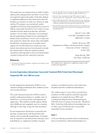 5 citations,
February 2015 in “Dermatologic Surgery”
5 citations,
February 2015 in “Dermatologic Surgery” Two cases of a rare skin condition were successfully treated with laser therapy, offering a non-surgical treatment option.
 37 citations,
August 2013 in “Facial Plastic Surgery Clinics of North America”
37 citations,
August 2013 in “Facial Plastic Surgery Clinics of North America” Facial hair restoration is generally successful and satisfying for patients when done with quality techniques and realistic expectations.
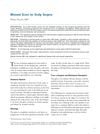 January 2007 in “Dermatologic Surgery”
January 2007 in “Dermatologic Surgery” A new scalp surgery technique leads to significantly thinner scars.
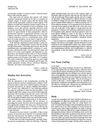 August 1998 in “Dermatologic Surgery”
August 1998 in “Dermatologic Surgery” Follicular unit hair transplantation is better than Miniflap Hair Restoration due to less scarring and more natural results.
 17 citations,
January 2007 in “Popular Communication”
17 citations,
January 2007 in “Popular Communication” Makeover TV shows promote unrealistic beauty standards and suggest women's worth is based on looks.
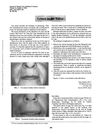 1 citations,
December 1996 in “Journal of Clinical Laser Medicine & Surgery”
1 citations,
December 1996 in “Journal of Clinical Laser Medicine & Surgery” A doctor describes a new, less expensive method for treating skin issues with a laser, and another doctor corrects a false claim about hair transplantation results.
 September 2009 in “Pediatric Dermatology”
September 2009 in “Pediatric Dermatology” UVB is good for a skin condition in Asian kids, a lotion works for head lice, a drug helps with a skin blistering disorder, a foam reduces itchiness in skin inflammation, birthmarks can be more widespread, and criteria for a neurocutaneous disorder were agreed upon.
 19 citations,
March 2008 in “Nature clinical practice endocrinology & metabolism”
19 citations,
March 2008 in “Nature clinical practice endocrinology & metabolism” A combined drug and laser treatment improved hirsutism in a PCOS patient, also enhancing her heart health and requiring regular liver and kidney checks.
 16 citations,
March 2013 in “The Journal of Dermatology”
16 citations,
March 2013 in “The Journal of Dermatology” Low TRPS1 expression in skin and hair cells is linked to hair problems in Trichorhinophalangeal syndrome.
 36 citations,
March 1987 in “Pediatrics”
36 citations,
March 1987 in “Pediatrics” Minoxidil use during pregnancy can cause excessive hair growth and multiple birth defects in the baby.
 7 citations,
June 2020 in “Journal of Cosmetic Dermatology”
7 citations,
June 2020 in “Journal of Cosmetic Dermatology” Turkish women with hirsutism experience lower quality of life, especially those with PCOS, regardless of hair growth severity.
1 citations,
October 2022 in “Biomedicines” Prdm1 is necessary for early whisker development in mice but not for other hair, and its absence changes nerve and brain patterns related to whiskers.
 27 citations,
January 2013 in “Indian Journal of Dermatology, Venereology and Leprology”
27 citations,
January 2013 in “Indian Journal of Dermatology, Venereology and Leprology” PCOS is a complex disorder managed by treating symptoms and requires a team of specialists.
 November 1919 in “The Journal of Hellenic Studies”
November 1919 in “The Journal of Hellenic Studies” The bronze head shows the high skill and beauty valued by ancient Greek sculptors.
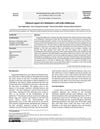 March 2021 in “Veterinary research forum”
March 2021 in “Veterinary research forum” A Holstein calf in Iran with a severe genetic skin disorder was euthanized due to incurable symptoms.
 49 citations,
January 2003 in “American Journal of Clinical Dermatology”
49 citations,
January 2003 in “American Journal of Clinical Dermatology” Effective management of children's hair loss involves accurate diagnosis, various treatments, and supportive care.
 6 citations,
August 1993 in “Archives of Dermatology”
6 citations,
August 1993 in “Archives of Dermatology” A woman's hair changed to a dry, tangled texture that's hard to comb after treatment with spironolactone, suggesting the medication might cause such hair changes.
 23 citations,
November 2001 in “Archives of Dermatology”
23 citations,
November 2001 in “Archives of Dermatology” Genetic discoveries are key for understanding, diagnosing, and treating inherited hair and nail disorders.
17 citations,
December 2013 in “Journal of Investigative Dermatology Symposium Proceedings” Autoimmune and metabolic issues are linked, and treating one may worsen another.
 175 citations,
April 1982 in “Journal of The American Academy of Dermatology”
175 citations,
April 1982 in “Journal of The American Academy of Dermatology” Isotretinoin is highly effective in treating severe acne, rosacea, and gram-negative folliculitis.
 12 citations,
May 2005 in “Current obstetrics and gynaecology/Current obstetrics & gynaecology”
12 citations,
May 2005 in “Current obstetrics and gynaecology/Current obstetrics & gynaecology” Hirsutism is too much hair growth in women like the pattern in men, often caused by high male hormones, and can be treated with hormone control and hair removal methods.


























